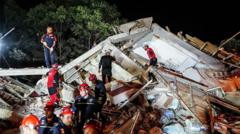As the US bombed key Iranian nuclear facilities, the emotional responses of ordinary Iranians reveal a mixture of fear, anger, and an unwavering commitment to their homeland, while concerns about the trajectory of their future mount.**
Voices from Iran: Fear and Resilience Amid Escalating Conflict with the US**

Voices from Iran: Fear and Resilience Amid Escalating Conflict with the US**
Iranians express their deep anguish and defiance following US strikes on their nuclear sites amidst ongoing regional tensions.**
The recent US strikes on key Iranian nuclear facilities have sent shockwaves through Iran, eliciting profound fear and anger among its citizens. Following the bombings of the Isfahan, Natanz, and Fordo sites, many Iranians have taken to platforms like BBC Persian to voice their distress and confusion. One woman, Shahla—a pseudonym to protect her identity—described her feelings of paralysis and helplessness, saying, "My days and nights are the same. I just stare at the ceiling all day and all night."
US President Donald Trump proclaimed that the strikes had "obliterated" these sites and issued a stark warning to Iran’s leadership, stating they now face a crucial choice between "peace or tragedy." In stark contrast, Iranian Foreign Minister Abbas Araghchi condemned the attacks, claiming they crossed a “big red line” and warned of significant and "everlasting consequences."
The US-led strikes have unfolded against the backdrop of a recent Israeli air campaign aimed at diminishing perceived existential threats from Iran’s nuclear and missile programs. Reports indicate that the strikes have resulted in considerable loss of life, with Iranian authorities citing at least 430 fatalities, while human rights groups estimate the toll could be much higher.
Communications in Iran have become increasingly constrained as the government has restricted internet access, complicating efforts for families to stay informed and connected. One individual, Mehri (a pseudonym), conveyed her heightened emotions in an audio message, expressing deep sorrow and anger over the conflict. "This war - Iran's war - is essentially a conflict between three individuals," she noted, referring to Trump, Israeli Prime Minister Benjamin Netanyahu, and Iran's Supreme Leader Ayatollah Ali Khamenei.
In the face of Trump's warning of further attacks should Iran retaliate, many citizens, such as a man from Maku named Homayoun, remain resolute. "We'll stand by our country to the very end. And if needed, we'll give our lives for our homeland, for our honour," he declared defiantly.
Iran’s military has issued threats of potential retaliation, emphasizing vulnerabilities associated with US military bases in the region. The leadership is reportedly aware of the high stakes, with some citizens hoping that this escalation signals a turning point towards de-escalation.
Others, however, express critical reflections on Iran's nuclear ambitions, viewing them as costly pursuits that have squandered resources. These voices reveal a desire for internal change—not dictated by foreign powers—highlighting a desire for a new approach to both international relations and domestic governance. A woman who fled Tehran conveyed a hope that her soon-to-be-born child would witness a "new Iran," focused on addressing real societal threats rather than enforcing stringent governmental regulations.
Through the spectrum of fear and resilience, ordinary Iranians are collectively grappling with the implications of their government's decisions, hoping for a peaceful resolution amidst the ongoing turmoil.



















